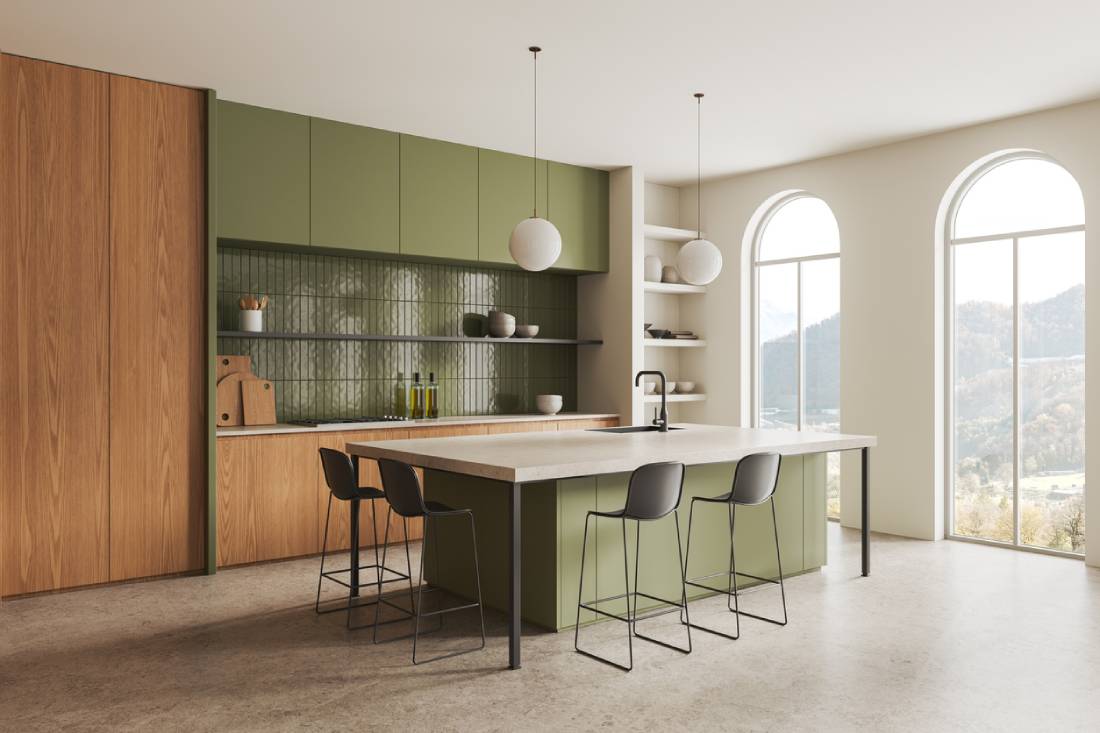As concern for the environment grows, more people find it important to incorporate environmentally sustainable materials and elements into their daily lives. One aspect of home life people are trying to make more sustainable is the kitchen. After all, the kitchen can be a substantial source of waste and energy usage if one is not careful with their use. If you would like to lower your kitchen’s carbon footprint, take a look at this guide that can point you toward eco-friendly and sustainable designs and materials for your kitchen remodeling.
Why Pick Eco-Friendly?
Choosing an eco-friendly design for your kitchen carries many benefits and is not as out-of-reach as it may have been in the past. An eco-friendly kitchen can save you money on traditional energy bills while giving you peace of mind that you are not taxing the environment with your daily tasks.
Eco-Friendly Kitchens: Sustainable Designs and Materials
There are many different sustainable materials and designs that can make your kitchen more energy-efficient and eco-friendly. Below are some of the more popular choices that have come into fashion in recent years:
1. Build With Reclaimed Materials
Using reclaimed and salvaged materials in your kitchen design is an eco-friendly way to build a functional, eco-friendly, and fashionable kitchen. Many retailers have made salvaged materials more readily available, making it easier than ever to implement these materials in your design.
Doing some research on companies that utilize salvaged or reclaimed materials in their design accessories can be a rewarding experience in itself. Learning more about these materials can constitute an educational experience.
2. Wait to Throw Out Kitchen Tools
Of course, when an item is no longer functional and cannot be repaired, it is time to part with it. But in a culture of disposability, holding onto your kitchenware and utensils for as long as they will last constitutes a more eco-friendly attitude than replacing something as soon as it loses a bit of luster. Many people appreciate a “lived-in” aesthetic anyway.
3. Choose Local Materials
Doing some research into local distributors that source their materials from the area they reside in can cut significantly into the carbon footprint of their operations. This is one of the most significant impacts you can make in terms of trying to make your kitchen more eco-friendly, as the resources that are employed in the global shipping industry are significant.
4. Switch to Energy Efficient Appliances
Updating the general appliances in your kitchen to more energy-efficient models can make a significant difference in the amount of energy that you use daily. Old appliances can often use more energy than some of the more recent models, which may be smart appliances like fridges and freezers that automatically condition themselves to operate in a more energy-efficient way.
5. Consider LED Lighting
LED lights are highly energy efficient and typically use up to 75-80% less energy than standard incandescent lightbulbs. In addition, these lights tend to last for many more times as long as standard bulbs.
6. Research Sustainable Materials
Some materials are more energy-efficient and eco-friendly when it comes to building on the elements of a kitchen. Some popular choices in this regard that will not break the bank include:
- Plywood: Plywood has grown in popularity in recent years as a sustainable building material. Designers praise it as durable, flexible, and affordable.
- Solid timber: Solid timber is a classic design element that stays in style. Timber is advantageous over plastic and other materials due to the fact that sustainably harvested timber is a renewable resource.
- Bamboo: Bamboo is a beautiful and durable plant that exerts very little stress on its surrounding environment. In addition, harvested bamboo will regrow rapidly, sometimes in a matter of days.
- Recycled glass: Recycled glass is an aesthetically appealing material that can be used in several different ways. This material has become more popular in the construction of eco-friendly countertops.
- Neolith: Neolith is a composite of recycled raw materials. Various materials are combined and subjected to intense heat and pressed into boards. You can use these boards for a variety of construction purposes.
Your Best Resource for Sustainable Materials
Ivory Homebuilders Inc. is a home remodeling contractor available for those who are interested in making their kitchens and other areas of their home more sustainable and eco-friendly. If you want to implement these qualities into your kitchen, contact us today to discuss your options.


